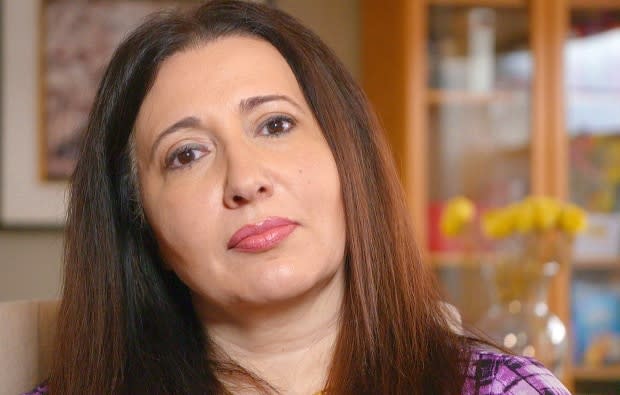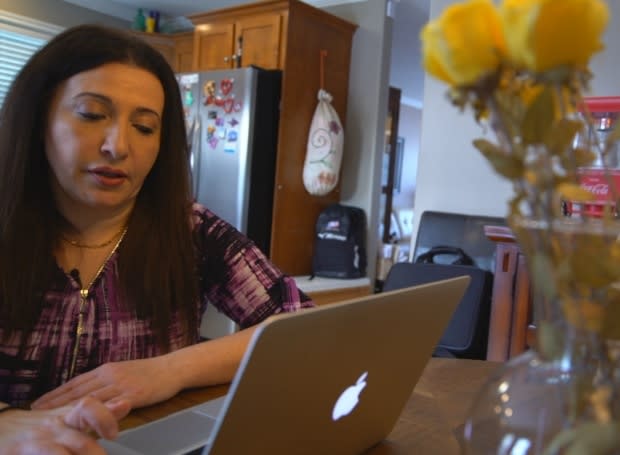She couldn't find the answers she needed on domestic violence. So this St. John's woman got to work

On Mother's Day 2019, a police officer knocked on the door of Cherine Day's St. John's home.
Her former partner, they told her, had been caught watching her house from his vehicle parked up the street. It came months after Day went to police with allegations of assault.
She says the last year and a half has taught her patience — not a lesson of her own choosing, but the byproduct of a system Day believes is failing women in Newfoundland and Labrador.
The single mom of two says she went to the Royal Newfoundland Constabulary in January 2019, after three years in a tumultuous relationship. Her former partner Leslie Miller is now facing charges of assault and criminal harassment.
Miller has pleaded not guilty. The allegations against him haven't been proven in court, and the trial has been delayed until October, due to the COVID-19 pandemic.
Day says going to police was not the end of a lengthy, confusing, and at times, frustrating journey. Instead, it was just the beginning.

"The onus is on me to make sure I want to meet with the Crown attorney, I want to make sure the evidence collected made it to disclosure, to understand what I can and can't do. What can I talk about? What can I not talk about?" said Day, from her St. John's home.
"There's no one place to provide a whole holistic view of it."
Resource centre she never had
In the spring of 2019, Day saw a social media post from a woman in Ontario who was trying to share information about her ex-boyfriend, Kevin Evans.
Evans was wanted in Ontario on charges of assault and sexual assault. He has since been convicted of assaulting two other ex-girlfriends in Newfoundland.
Day reached out to the Ontario woman, whose name is covered by a publication ban, and since then they've been running a Facebook page dedicated to educating and helping other women. It has hundreds of members who are screened before being allowed to join to ensure the women in the group feel safe.
It's the resource centre Day says she never had, and aims to fill a void in the system.

"It's not a bashing group — posting photos of men. We're more of a supportive community, we talk about how do we support each other," Day said, adding the women plan to ensure no one has to attend court alone.
Day says they help with victim impact statements and talk with each other about how the process will unfold in the police station and in the courtroom.
Day applauds the RNC's intimate partner violence unit but says there are just not enough members to keep up. RNC Chief Joe Boland has not committed to expanding the unit, but says he would like to if the resources were available.
Victim services is also an option, but Day says they cannot be expected to answer every question from every facet of the complex system.
"Everybody is overworked. There's so many cases, they don't have time to sit down and speak with you," she said.
"For me, I need to understand, OK when I make a charge, what happens next? What are the things I need to be expecting? They don't explain the process."
It's just a colossal mess for some women. - Michelle Greene
Day has met with Michelle Greene, executive director of Iris Kirby House, who agrees there needs to be a more streamlined system.
"I think there's many silos in the justice system," Greene said in an interview with CBC News for the series Stopping Domestic Violence.
"I'm a social worker. Many of the staff here have professional degrees as well and we have trouble navigating many of the systems."
Greene said in many cases a woman could be tackling the justice, law enforcement, housing and child services systems all at once.
"It's a colossal mess for some women."
The good and the bad of social media
Day says her Facebook page is creating positive results, but she also sees the flip side of social media — how domestic violence can flourish online.
She has seen examples of women who have met partners on dating apps, only to later realize they have a history of abuse.
"There's nothing from a social media perspective to stop them. There has to be some accountability," Day said.
"If you're willing to date someone like that, that's fine but most of these women don't know. They have no clue."

Greene says she has seen an increase in women seeking shelter at Iris Kirby House after meeting men on dating apps.
Once they get here, Greene says, they are trapped in violent, forceful relationships.
A time of reckoning
Big players in the online dating world, like Tinder and Bumble, have guidelines in place to deal with abusive users — but only if they are flagged about the behaviour.
"When a user reports an assault to Tinder, we attempt to identify the alleged perpetrator and block the associated account," a spokesperson from Tinder told CBC News.
Several online dating services, such as Tinder, Hinge, Plenty of Fish, Match and OKCupid, are owned by the same company — Match Group.
"The incident is then reported to Match Group's centralized safety repository and checked across our various brands to see if the user has other accounts on other platforms," the spokesperson said. "If any are found, they are blocked as well."
Day believes this is a time of reckoning for women who once felt silenced by their abusers.
Together, she said, they feel empowered to go against the grain and fight for a better system.
Day is preparing for Miller's trial this fall.
When she goes through the doors of provincial court in St. John's, she takes solace that she won't be alone.
If you need help and are in immediate danger, call 911. To find assistance in your area click here.
For general advice, contact IPVU at IPV@rnc.gov.nl.ca or call 709-729-8093
Are you facing intimate partner violence? Here are some resources in N.L. that can help.
Read more by CBC Newfoundland and Labrador


